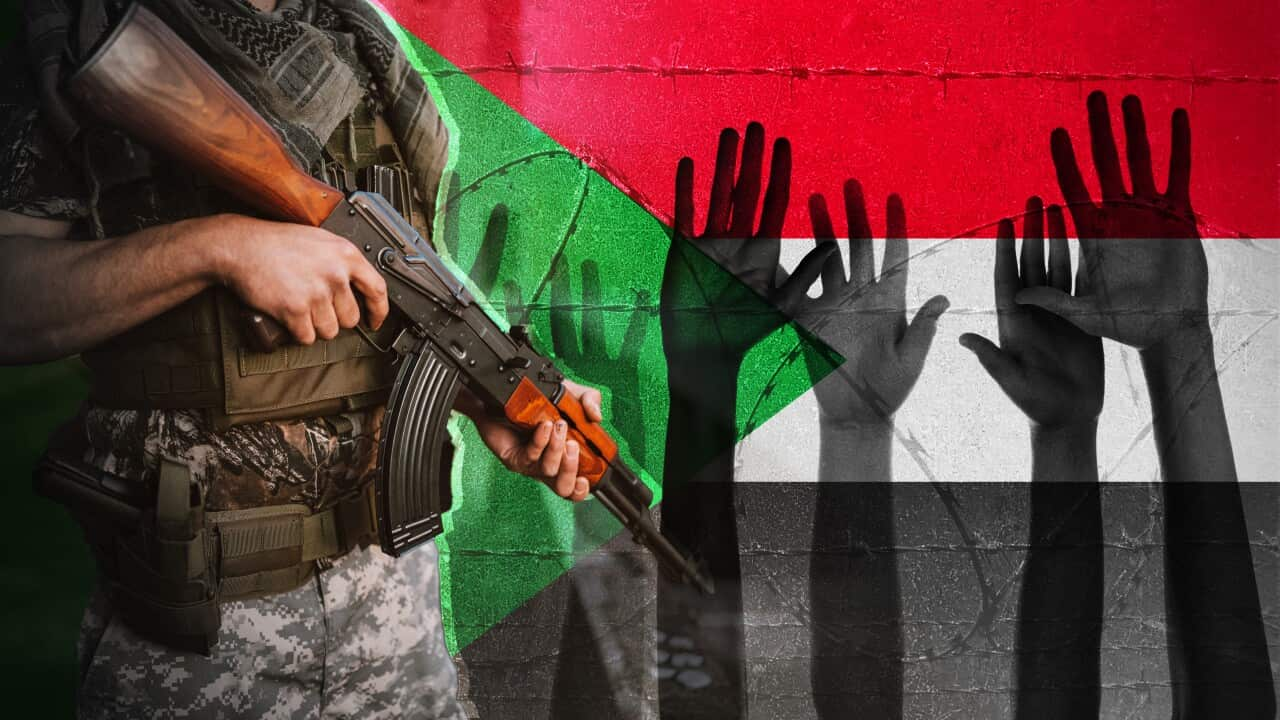While the conflict is never far from El Hassan’s mind, many Australians have never heard of it.

Yasir El Hassan and his mum Dr Ahlam Ibraheem are spreading awareness of the war in Sudan and supporting their community in Sydney. Source: Supplied
Sudan’s forgotten war
The World Health Organization (WHO) reported in May that the country is facing imminent famine, with 3.6 million children “acutely malnourished” of a total 18 million people experiencing acute hunger.
“It feels like Sudan is just being forgotten about — not even forgotten about because no one actually knows to begin with,” he says.

The United Nations says Sudan has “the largest internally displaced population ever reported.” Source: SBS News
How did the war in Sudan start?
In response to international condemnation, the SAF and the RSF agreed to share power with civilian leaders and transition the country of almost 50 million people to a civilian-led democracy.
While information about casualties is scarce, the United Nations estimates that tens of thousands of people have been killed in the power struggle over the past 18 months.
The human toll of civil war
“It is a war between military and paramilitary and who’s the victim? It’s the people there, the innocent people,” she says.

Fleeing violence in Sudan, Dr Ibraheem’s mother Omelnsar (right) moved to Australia last year. Source: Supplied
Ibraheem’s brothers and elderly mother have been displaced by the war; her mother, Omelnsar, escaped through Egypt in the first months of the conflict and eventually joined Ibraheem in Australia.
“His son sent us a message [saying] ‘Dad lost his vision’, and we couldn’t communicate with them for a whole month. We didn’t know what happened. Was he shot by a gun? It was a very hard time.”

Yasir and Ahman’s family home in Khartoum was destroyed in the conflict. Source: Supplied
Residential neighbourhoods in Sudan have become battlefields — their family house in the capital Khartoum was destroyed late last year amid an outbreak of fighting between the warring factions.
“Hopefully, in the future, Sudan will be rebuilt, and that’s the best outcome we can hope for, but it’s just not going to be the same.”

Why do we rarely hear about the Sudan crisis in Australia?
“You need resources and assets on the ground in those places, and that’s both expensive and dangerous. But also, there’s that axiom in media studies that one person killed in your local area is as important, or probably more important than 100,000 people killed on the other side of the world,” Jakubowicz says.

Professor Andrew Jakubowicz is an expert in ethnic diversity issues and media studies. Source: Supplied
“There’s also another factor that you can’t rule out, which is [that] exposing yourself to these narratives also generates an enormous sense of frustration.”
“We work hard here and we’re paying tax, and we [do] see not even a single word about what’s happening back in our country — no support at all,” she says.
“We are trying to empower our community by improving health awareness to reduce the stress … And also for the newly-arrived people. After the war, we want to try to engage the new people [in] the Australian community,” she says.

Dr Ahlam Ibraheem’s organisation provides culturally aware support for Sudanese Australians and refugees from the conflict. Source: Supplied
Founder and Chair of the African Australian Advocacy Centre, Noël Zihabamwe, says the lack of coverage of African issues is also partly due to a perpetuation of .
“Big media here, they tend to show the negative image. [But] once we start demonstrating the positives for African Australians — the contributions we’re making here — that image of Africans, not only Africans [in Australia] but also Africans in Africa, will change,” Zihabamwe says.
“If there was more about the diversity of Australia and the important elements in the lives of the people who have arrived, then that sense of understanding difference — what we’d call intercultural communication — would be greatly improved.”
